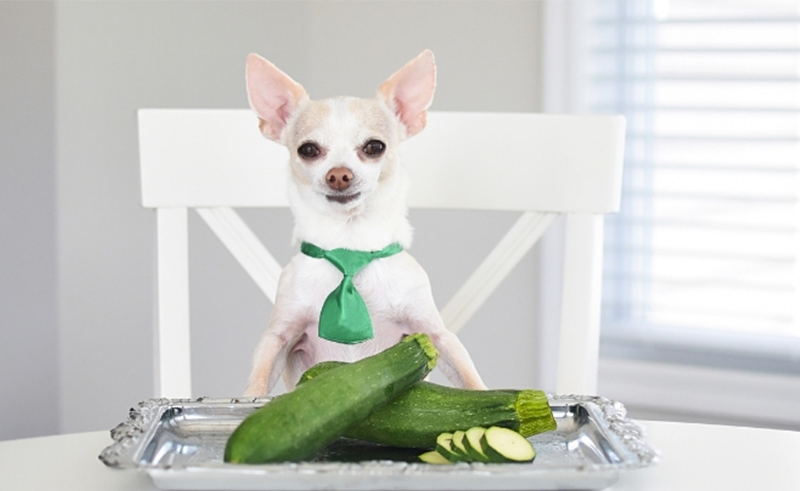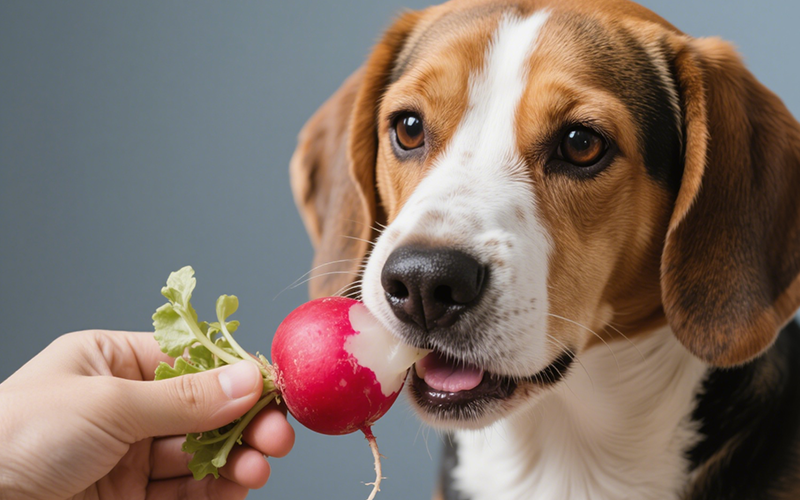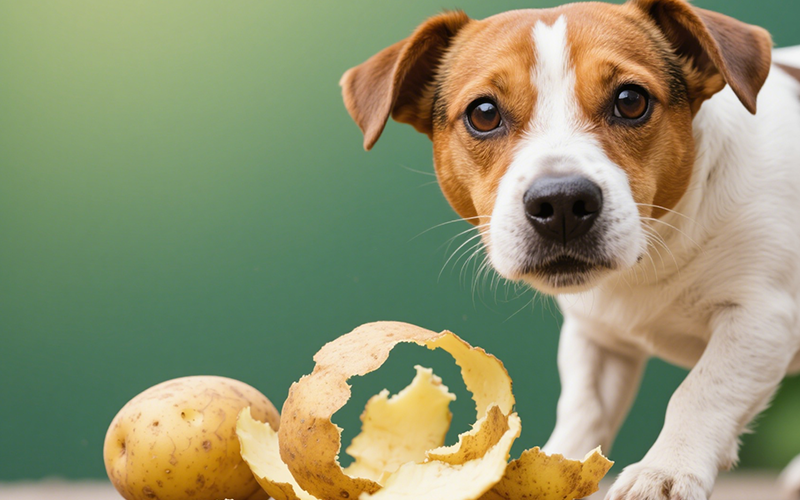Can Dogs Eat Zucchini? A Guide to Serving Zucchini Safely to Your Dog
- 25 Feb 2025 13:58
If you’re a fan of healthy, low-calorie snacks, you might be wondering if your dog can enjoy the same treat. Zucchini, a popular summer vegetable, is not only delicious but also nutritious for humans. But when it comes to our dogs, can dogs eat zucchini? The answer is yes! Zucchini is safe for dogs to eat and can be a great addition to their diet, offering several health benefits. However, like all foods, there are some important things to know before sharing it with your dog.

Health Benefits of Zucchini for Dogs
Low in Calories and FatZucchini is naturally low in calories and fat, making it a great choice for dogs who need to maintain a healthy weight or those with a tendency to gain weight easily. It’s a perfect treat for pups on a diet or those who love to snack throughout the day without adding too many extra calories to their diet.
High in NutrientsZucchini is packed with important nutrients that support overall health:
Vitamins: Zucchini is rich in vitamins like Vitamin C (which supports the immune system) and Vitamin A (important for eye health and skin).
Minerals: It contains minerals like potassium (which helps regulate blood pressure) and manganese (important for bone health).
Fiber: Zucchini is a good source of fiber, which promotes healthy digestion. This can be particularly helpful for dogs with mild digestive issues like constipation.
HydratingSince zucchini is made up of about 95% water, it’s a hydrating treat for your dog, especially during hot weather. This can help support your dog’s hydration levels, particularly if they’re not drinking enough water throughout the day.
Antioxidant PropertiesZucchini contains antioxidants like beta-carotene, which help protect your dog’s cells from damage caused by free radicals. Antioxidants play a key role in preventing chronic diseases and slowing the aging process.
How to Safely Serve Zucchini to Dogs
While zucchini is generally safe for dogs, it’s important to know the right way to serve it to minimize any risks:
Serve Raw or CookedYou can feed zucchini to your dog raw or cooked. Both forms have their benefits:
Raw zucchini: Provides more of its natural enzymes and nutrients, but it may be a bit tougher for some dogs to chew.
Cooked zucchini: Cooking zucchini can make it easier for your dog to digest. Be sure to steam or boil the zucchini without adding any oil, salt, or spices. Avoid using butter or seasonings like garlic or onion, as these can be harmful to dogs.
Cut into Small PiecesIf you’re serving raw zucchini, it’s important to cut it into small, bite-sized pieces to prevent any choking hazards, especially for smaller dogs. Slicing or dicing the zucchini makes it safer for your dog to eat.
Moderation is KeyWhile zucchini is healthy, it should only be served in moderation. Too much of any food can upset your dog’s stomach, leading to gas, bloating, or diarrhea. A small amount of zucchini (a few slices or a tablespoon) as a treat is generally enough.
Avoid the Skin if Your Dog Has Digestive IssuesIf your dog has a sensitive stomach or is prone to digestive upset, it might be best to peel the zucchini before offering it. While the skin is not harmful, it can be a bit tougher to digest, particularly for dogs with sensitive tummies.
Potential Risks of Zucchini for Dogs
Zucchini is considered safe for most dogs, but there are a few things to keep in mind to prevent any issues:
Possible Digestive UpsetIn rare cases, eating too much zucchini can cause digestive upset in dogs. The fiber content, while beneficial, can be overwhelming for some dogs if they aren’t used to it. If you notice your dog having difficulty digesting zucchini (such as bloating, gas, or diarrhea), reduce the amount you’re feeding them or avoid it altogether.
Choking HazardIf zucchini is not properly prepared, there’s a potential risk of choking, especially for smaller dogs or those who tend to gulp food. Always cut zucchini into small, manageable pieces.
Allergic ReactionsThough rare, some dogs may be allergic to zucchini. If your dog shows any signs of an allergic reaction, such as itching, swelling, or hives, stop feeding them zucchini immediately and consult with your veterinarian.
GMO ZucchiniWhile zucchini itself is generally safe, it’s a good idea to look for organic zucchini when possible. Some conventionally grown zucchinis may have been treated with pesticides or genetically modified (GMO). Though GMOs are generally considered safe, some pet owners prefer to avoid them for health reasons.
Can Zucchini Help with Weight Loss?
Yes, zucchini can be a helpful food for dogs that need to lose weight. Due to its low calorie and high fiber content, zucchini can be a filling treat that helps keep your dog full without adding excess calories. If your dog is overweight, substituting high-calorie treats with zucchini can help manage their weight while still providing a tasty snack.
Alternatives to Zucchini
If your dog doesn’t enjoy zucchini or you’re looking for a variety of healthy snacks, there are many other dog-safe vegetables you can try. Here are a few alternatives:
Carrots: Low in calories and high in fiber, carrots make a crunchy and healthy snack.
Green beans: These are high in fiber and low in calories, making them an excellent treat for dogs on a diet.
Cucumbers: Like zucchini, cucumbers are hydrating and low in calories, perfect for a refreshing snack.
Sweet potatoes: Packed with nutrients and fiber, sweet potatoes are a great option for dogs in moderation.
Pumpkin: Plain, cooked pumpkin is another fiber-rich option that can support digestion.
Should You Use PettureX for Your Dog’s Health?
If you're unsure whether zucchini or any other food is safe for your dog, or if you have concerns about their diet, PettureX is a helpful resource. PettureX provides 24/7 online consultations with pet health professionals who can offer personalized advice on what foods are best for your dog’s health and well-being.
Conclusion: Can Dogs Eat Zucchini?
In conclusion, zucchini is a safe and healthy treat for dogs when served in moderation and prepared properly. With its low calorie, high fiber, and nutrient-rich profile, zucchini can be a great addition to your dog’s diet. It’s particularly beneficial for dogs who need to maintain a healthy weight or those looking for a hydrating snack.
Always remember to serve zucchini in small pieces, without any added seasoning or oil, and keep an eye out for any digestive issues. If you have concerns about your dog’s health or diet, PettureX is available for 24/7 online consultations to guide you on making the best decisions for your pet.
Related

Radish Bites for Your Buddy? A Vet-Reviewed Guide on Whether Dogs Can Eat Radishes
- 22 Apr 2025
Potato Peels for Pooches? Unpeeling the Risks and Facts for Dog Owners
- 22 Apr 2025
Crunchy Curiosity: Can Dogs Safely Snack on Pork Rinds? A Deep Dive
- 21 Apr 2025
Pomegranate Seeds and Pooches: A Deep Dive into Whether Dogs Can Safely Indulge
- 21 Apr 2025
Can Dogs Eat Peaches? Vet Explains Benefits, Cyanide Risks & Safe Serving
- 16 Apr 2025
Can Dogs Eat Mulberries? Vet Explains Safety, Benefits & Potential Risks
- 16 Apr 2025
Can Dogs Eat Mozzarella? Vet Explains the Cheesy Truth (Risks & Benefits)
- 16 Apr 2025
Can Dogs Eat Mango Skin? Vet Explains Why It's a Risky Chew!
- 16 Apr 2025
Can Dogs Eat Maple Syrup? The Sugary Truth & Why Vets Advise Against It
- 16 Apr 2025
Can Dogs Eat Mac n Cheese? Vet Explains Why This Comfort Food Is Unsafe!
- 16 Apr 2025
